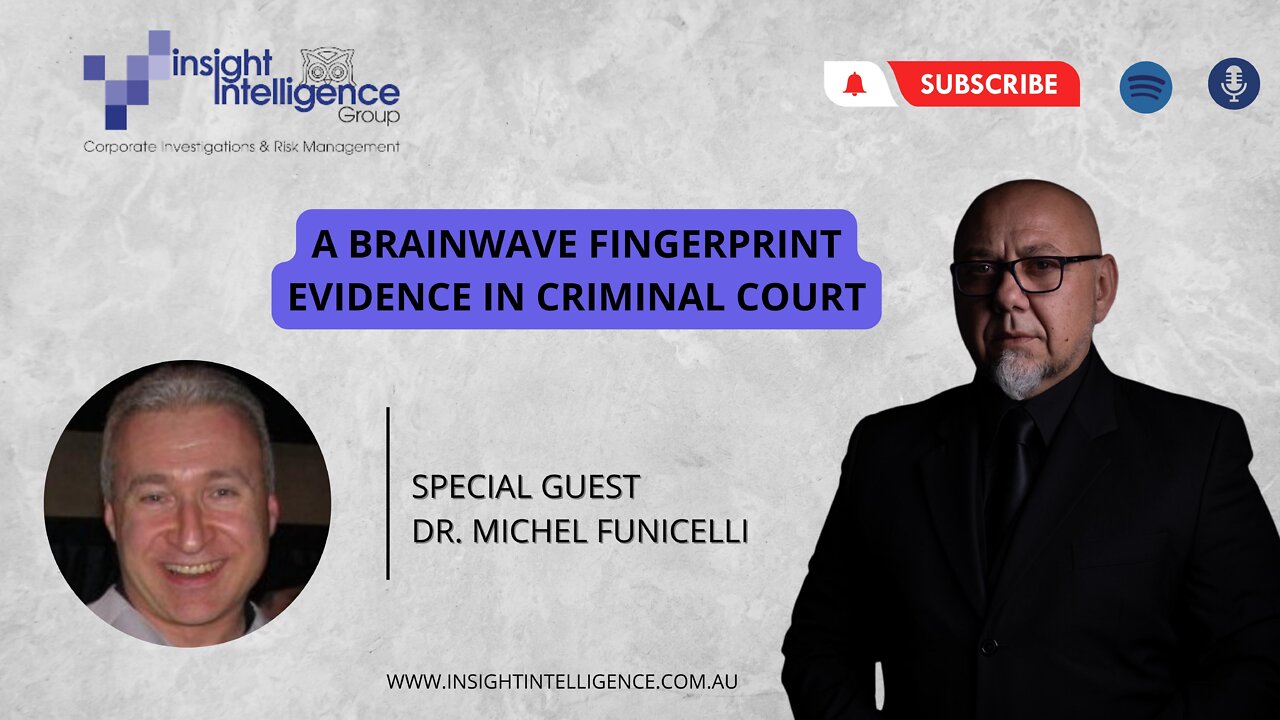Premium Only Content

A Brainwave fingerprint evidence in criminal court!
Brain fingerprinting allows investigators to identify or exonerate subjects through measurement of brain-wave responses to crime-related pictures or words presented on a computer screen. The technique is based on the principle that the brain is central to all human activities, it plans, executes, and records information. If a subject has information pertaining to a crime, that information is permanently recorded in the brain and, with proper training and technology, can be retrieved.
About Dr. Michel Funicelli
Former lecturer at Charles Sturt University (NSW, Australia) at the School of Policing Studies. Retired police officer with the Royal Canadian Mounted Police with operational experience in patrol, serious crime, federal investigations (i.e. smuggling and drug enforcement), and organised crime. My academic research interests are in memory detection through brainwave analysis (P300-based Concealed Information Test), lie detection, investigative interviewing, psychopathy, and psychology of terrorism.
Follow Mario Bekes Here:
https://www.mariobekes.com.au/
https://insightintelligence.com.au/
https://www.linkedin.com/in/mariobekes/?originalSubdomain=au
#intelligence #riskmanagement #insightintelligencegroup #mariobekes #industrialespionage #economicespionage #humanintelligence #investigations #investigativeintelligence #interviewtraining #dubaibusiness #singaporebusiness #fraudprevention #claimsmanagement #leadership #coaching #motivation #corporate #organisations #llawofattraction #inspiration #motivation #education
-
 DVR
DVR
TheCrucible
1 hour agoThe Extravaganza! Ep. 26 (with special guest host Rob Noerr) 8/25/25
30.5K3 -
 7:35
7:35
Tundra Tactical
55 minutes agoI Can’t Believe I’m Saying This… 2011’s Are Actually COOL Now?! 🤯
-
 LIVE
LIVE
Wayne Allyn Root | WAR Zone
3 hours agoWAR Zone LIVE | 25 AUGUST 2025
109 watching -
 LIVE
LIVE
Outspoken with Dr. Naomi Wolf
3 hours ago"CPA/Whistleblower Sam Antar Identifies Millions in Fraud Behind Mamdani Campaign"
62 watching -
 41:26
41:26
Kimberly Guilfoyle
2 hours agoMaking DC Safe Again, Live with Daily Signal's Tyler O'Neil | Ep249
59.6K16 -
 LIVE
LIVE
Dr Disrespect
6 hours ago🔴LIVE - DR DISRESPECT VS. JEAN-CLAUDE VAN DAMME - HITMAN
1,329 watching -
 32:43
32:43
Uncommon Sense In Current Times
4 days agoAre Women’s Sports Under Attack? | Penny Nance on Protecting Title IX & Biblical Truth
9.57K -
 LIVE
LIVE
LFA TV
22 hours agoLFA TV ALL DAY STREAM - MONDAY 8/25/25
1,146 watching -
 LIVE
LIVE
freecastle
7 hours agoTAKE UP YOUR CROSS- PROTECTING FREEDOM, PRESERVING HOPE!
140 watching -
 1:17:44
1:17:44
The HotSeat
2 hours agoTrump Drops Hammer: Burn the Flag = 1 Year Prison! Army Deployment Next?!
17.7K23